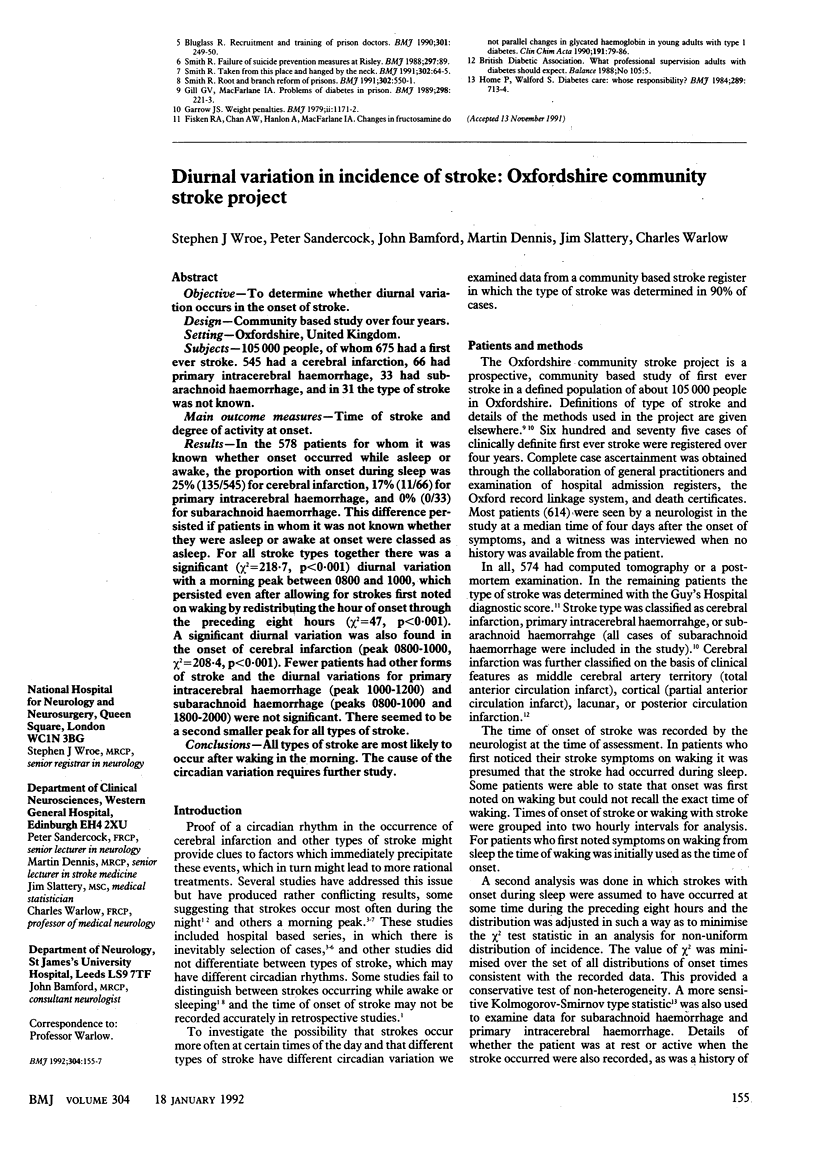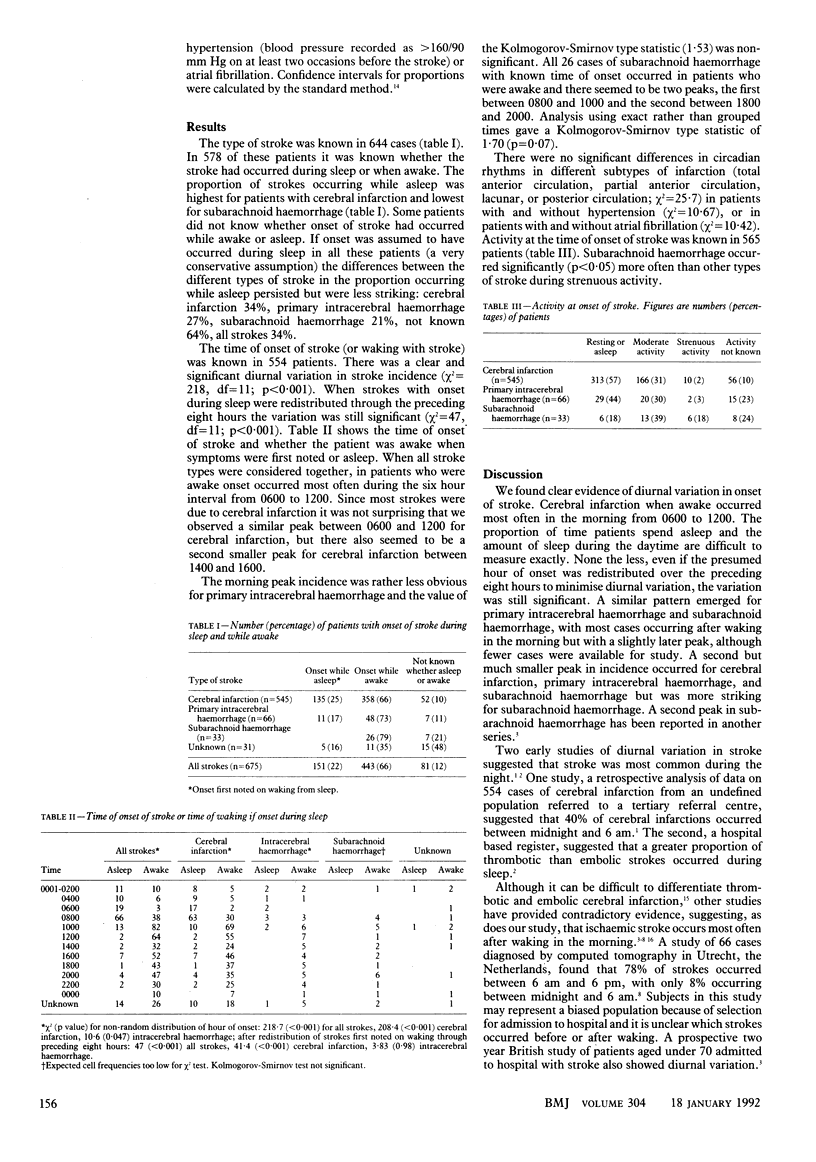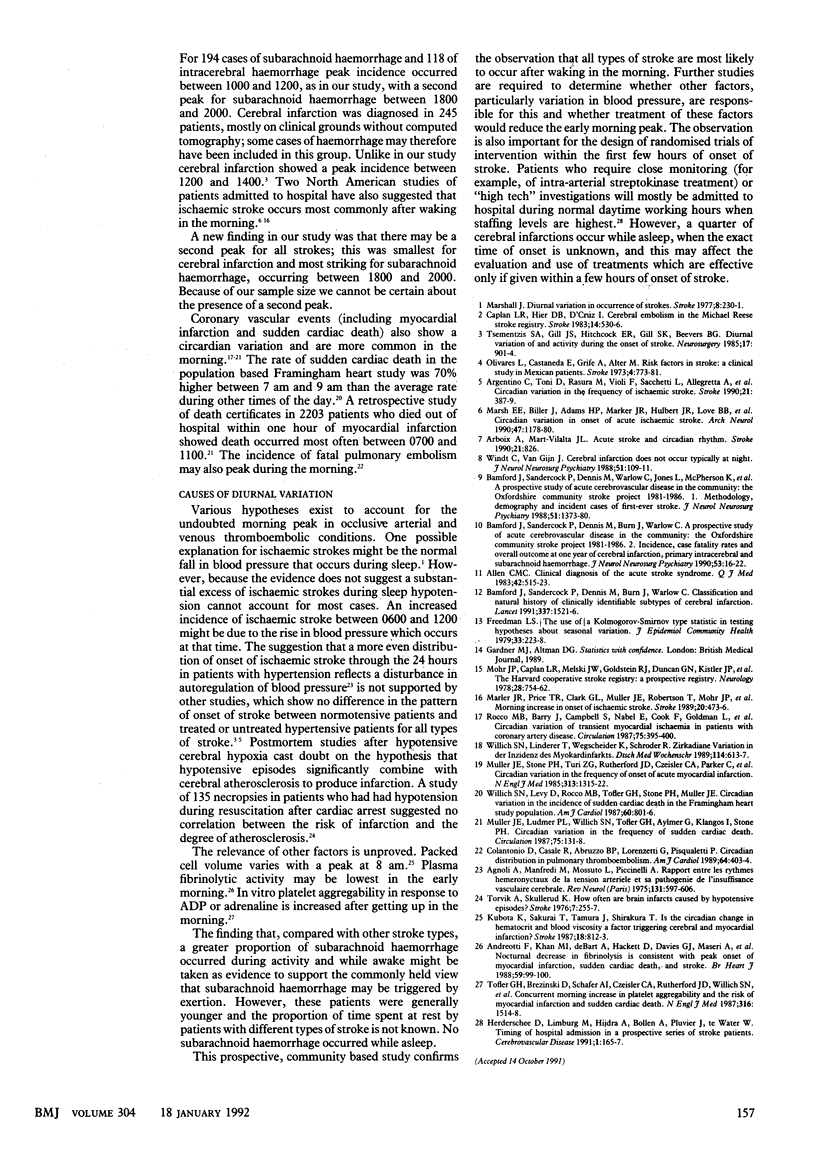Abstract
OBJECTIVE--To determine whether diurnal variation occurs in the onset of stroke. DESIGN--Community based study over four years. SETTING--Oxfordshire, United Kingdom. SUBJECTS--105,000 people, of whom 675 had a first ever stroke. 545 had a cerebral infarction, 66 had primary intracerebral haemorrhage, 33 had subarachnoid haemorrhage, and in 31 the type of stroke was not known. MAIN OUTCOME MEASURES--Time of stroke and degree of activity at onset. RESULTS--In the 578 patients for whom it was known whether onset occurred while asleep or awake, the proportion with onset during sleep was 25% (135/545) for cerebral infarction, 17% (11/66) for primary intracerebral haemorrhage, and 0% (0/33) for subarachnoid haemorrhage. This difference persisted if patients in whom it was not known whether they were asleep or awake at onset were classed as asleep. For all stroke types together there was a significant (chi 2 = 218.7, p less than 0.001) diurnal variation with a morning peak between 0800 and 1000, which persisted even after allowing for strokes first noted on waking by redistributing the hour of onset through the preceding eight hours (chi 2 = 47, p less than 0.001). A significant diurnal variation was also found in the onset of cerebral infarction (peak 0800-1000, chi 2 = 208.4, p less than 0.001). Fewer patients had other forms of stroke and the diurnal variations for primary intracerebral haemorrhage (peak 1000-1200) and subarachnoid haemorrhage (peaks 0800-1000 and 1800-2000) were not significant. There seemed to be a second smaller peak for all types of stroke. CONCLUSIONS--All types of stroke are most likely to occur after waking in the morning. The cause of the circadian variation requires further study.
Full text
PDF


Selected References
These references are in PubMed. This may not be the complete list of references from this article.
- Agnoli A., Manfredi M., Mossuto L., Piccinelli A. Rapport entre les rythmes héméronyctaux de la tension artérielle et sa pathogénie de l'insuffisance vasculaire cérébrale. Rev Neurol (Paris) 1975 Sep;131(9):597–606. [PubMed] [Google Scholar]
- Allen C. M. Clinical diagnosis of the acute stroke syndrome. Q J Med. 1983 Autumn;52(208):515–523. [PubMed] [Google Scholar]
- Arboix A., Martí-Vilalta J. L. Acute stroke and circadian rhythm. Stroke. 1990 May;21(5):826–826. [PubMed] [Google Scholar]
- Argentino C., Toni D., Rasura M., Violi F., Sacchetti M. L., Allegretta A., Balsano F., Fieschi C. Circadian variation in the frequency of ischemic stroke. Stroke. 1990 Mar;21(3):387–389. doi: 10.1161/01.str.21.3.387. [DOI] [PubMed] [Google Scholar]
- Bamford J., Sandercock P., Dennis M., Burn J., Warlow C. A prospective study of acute cerebrovascular disease in the community: the Oxfordshire Community Stroke Project--1981-86. 2. Incidence, case fatality rates and overall outcome at one year of cerebral infarction, primary intracerebral and subarachnoid haemorrhage. J Neurol Neurosurg Psychiatry. 1990 Jan;53(1):16–22. doi: 10.1136/jnnp.53.1.16. [DOI] [PMC free article] [PubMed] [Google Scholar]
- Bamford J., Sandercock P., Dennis M., Burn J., Warlow C. Classification and natural history of clinically identifiable subtypes of cerebral infarction. Lancet. 1991 Jun 22;337(8756):1521–1526. doi: 10.1016/0140-6736(91)93206-o. [DOI] [PubMed] [Google Scholar]
- Bamford J., Sandercock P., Dennis M., Warlow C., Jones L., McPherson K., Vessey M., Fowler G., Molyneux A., Hughes T. A prospective study of acute cerebrovascular disease in the community: the Oxfordshire Community Stroke Project 1981-86. 1. Methodology, demography and incident cases of first-ever stroke. J Neurol Neurosurg Psychiatry. 1988 Nov;51(11):1373–1380. doi: 10.1136/jnnp.51.11.1373. [DOI] [PMC free article] [PubMed] [Google Scholar]
- Caplan L. R., Hier D. B., D'Cruz I. Cerebral embolism in the Michael Reese Stroke Registry. Stroke. 1983 Jul-Aug;14(4):530–536. doi: 10.1161/01.str.14.4.530. [DOI] [PubMed] [Google Scholar]
- Freedman L. S. The use of a Kolmogorov--Smirnov type statistic in testing hypotheses about seasonal variation. J Epidemiol Community Health. 1979 Sep;33(3):223–228. doi: 10.1136/jech.33.3.223. [DOI] [PMC free article] [PubMed] [Google Scholar]
- Kubota K., Sakurai T., Tamura J., Shirakura T. Is the circadian change in hematocrit and blood viscosity a factor triggering cerebral and myocardial infarction? Stroke. 1987 Jul-Aug;18(4):812–813. [PubMed] [Google Scholar]
- Marler J. R., Price T. R., Clark G. L., Muller J. E., Robertson T., Mohr J. P., Hier D. B., Wolf P. A., Caplan L. R., Foulkes M. A. Morning increase in onset of ischemic stroke. Stroke. 1989 Apr;20(4):473–476. doi: 10.1161/01.str.20.4.473. [DOI] [PubMed] [Google Scholar]
- Marsh E. E., 3rd, Biller J., Adams H. P., Jr, Marler J. R., Hulbert J. R., Love B. B., Gordon D. L. Circadian variation in onset of acute ischemic stroke. Arch Neurol. 1990 Nov;47(11):1178–1180. doi: 10.1001/archneur.1990.00530110032012. [DOI] [PubMed] [Google Scholar]
- Marshall J. Diurnal variation in occurrence of strokes. Stroke. 1977 Mar-Apr;8(2):230–231. doi: 10.1161/01.str.8.2.230. [DOI] [PubMed] [Google Scholar]
- Mohr J. P., Caplan L. R., Melski J. W., Goldstein R. J., Duncan G. W., Kistler J. P., Pessin M. S., Bleich H. L. The Harvard Cooperative Stroke Registry: a prospective registry. Neurology. 1978 Aug;28(8):754–762. doi: 10.1212/wnl.28.8.754. [DOI] [PubMed] [Google Scholar]
- Muller J. E., Ludmer P. L., Willich S. N., Tofler G. H., Aylmer G., Klangos I., Stone P. H. Circadian variation in the frequency of sudden cardiac death. Circulation. 1987 Jan;75(1):131–138. doi: 10.1161/01.cir.75.1.131. [DOI] [PubMed] [Google Scholar]
- Muller J. E., Stone P. H., Turi Z. G., Rutherford J. D., Czeisler C. A., Parker C., Poole W. K., Passamani E., Roberts R., Robertson T. Circadian variation in the frequency of onset of acute myocardial infarction. N Engl J Med. 1985 Nov 21;313(21):1315–1322. doi: 10.1056/NEJM198511213132103. [DOI] [PubMed] [Google Scholar]
- Olivares L., Castańeda E., Grifé A., Alter M. Risk factors in stroke: a clinical study in Mexican patients. Stroke. 1973 Sep-Oct;4(5):773–781. doi: 10.1161/01.str.4.5.773. [DOI] [PubMed] [Google Scholar]
- Rocco M. B., Barry J., Campbell S., Nabel E., Cook E. F., Goldman L., Selwyn A. P. Circadian variation of transient myocardial ischemia in patients with coronary artery disease. Circulation. 1987 Feb;75(2):395–400. doi: 10.1161/01.cir.75.2.395. [DOI] [PubMed] [Google Scholar]
- Tofler G. H., Brezinski D., Schafer A. I., Czeisler C. A., Rutherford J. D., Willich S. N., Gleason R. E., Williams G. H., Muller J. E. Concurrent morning increase in platelet aggregability and the risk of myocardial infarction and sudden cardiac death. N Engl J Med. 1987 Jun 11;316(24):1514–1518. doi: 10.1056/NEJM198706113162405. [DOI] [PubMed] [Google Scholar]
- Torvik A., Skullerud K. How often are brain infarcts caused by hypotensive episodes? Stroke. 1976 May-Jun;7(3):255–257. doi: 10.1161/01.str.7.3.255. [DOI] [PubMed] [Google Scholar]
- Tsementzis S. A., Gill J. S., Hitchcock E. R., Gill S. K., Beevers D. G. Diurnal variation of and activity during the onset of stroke. Neurosurgery. 1985 Dec;17(6):901–904. doi: 10.1227/00006123-198512000-00005. [DOI] [PubMed] [Google Scholar]
- Willich S. N., Levy D., Rocco M. B., Tofler G. H., Stone P. H., Muller J. E. Circadian variation in the incidence of sudden cardiac death in the Framingham Heart Study population. Am J Cardiol. 1987 Oct 1;60(10):801–806. doi: 10.1016/0002-9149(87)91027-7. [DOI] [PubMed] [Google Scholar]
- Willich S. N., Linderer T., Wegscheider K., Schröder R. Zirkadiane Variation in der Inzidenz des Myokardinfarkts. Neue Erkenntnisse über die Mechanismen der akuten koronaren Herzkrankheit. Dtsch Med Wochenschr. 1989 Apr 21;114(16):613–617. doi: 10.1055/s-2008-1066644. [DOI] [PubMed] [Google Scholar]
- van der Windt C., van Gijn J. Cerebral infarction does not occur typically at night. J Neurol Neurosurg Psychiatry. 1988 Jan;51(1):109–111. doi: 10.1136/jnnp.51.1.109. [DOI] [PMC free article] [PubMed] [Google Scholar]


